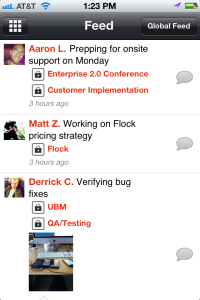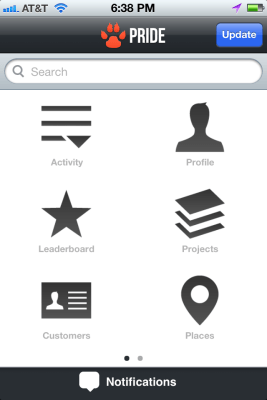Following its $2 million Series A this spring, enterprise-focused mobile startup DoubleDutch is today introducing a new app called Pride whose debut coincidentally arrives alongside reports that Microsoft is after a startup that could be Pride’s competition: Yammer. Like Yammer, Pride is also focused on workgroup collaboration, but, like most of what DoubleDutch does, it’s not just mobile-first, it’s mobile-only.
Lawrence Coburn, founder and CEO at DoubleDutch, says the timing of Pride’s launch is “kind of unbelievable, actually,” given the reported Microsoft/Yammer deal.
 “It really is a ‘what are you working on?’ app with a couple of big differences from Yammer,” explains Coburn. He then goes on to describe Pride as a mobile-only way for teams to collaborate across locations by sharing status updates. But the major differentiator is that Pride was built around the concept of structured data.
“It really is a ‘what are you working on?’ app with a couple of big differences from Yammer,” explains Coburn. He then goes on to describe Pride as a mobile-only way for teams to collaborate across locations by sharing status updates. But the major differentiator is that Pride was built around the concept of structured data.
What that means is that, in Pride’s case, users aren’t just posting text updates as in Yammer, they’re “checking in to objects.” These objects can be projects they’re working on, locations, or the companies and customers they’re involved with. The idea is that with Pride, teams don’t just have a feed of activity, they have a structured feed where each of these objects end up with their own feeds, thanks to the way the data is initially created.
With just a tap, staff can see all the activity related to Project X or Customer Y, and that ability has “major implications” on the analytics side of the business, says Coburn. For example, using the data collected and the related charts and graphs DoubleDutch’s Pride produces, a business could analyze how often their top sales people reach out to clients, and then compare that with trends among junior staffers to aid in training. That’s only one example, of course. Being able to slice and dice the “what you’re working on” data has a number of potential impacts, from project budgeting to improvements in employee productivity.
In addition to posting updates, Pride also has elements of game mechanics, including customizable badges, leaderboards, and a points structure to reward employees for different activities. During its private beta, companies adopting the app saw internal email use drop 34% on average. But most importantly, says Coburn, Pride enables companies to introduce a culture of accountability, a celebration of achievement and a culture of trust through the app’s usage.
Pride is being introduced as a free application targeted at small teams in the hopes of building a high volume of users who will then be attracted to DoubleDutch’s other premium offerings. These include the company’s enterprise-friendly CRM Hive or white-label event planner Flock, which combined have 100,000 users at companies like HP, Cisco, Adobe, Lowe’s and Roche. At present, the only “ads” for these other services in Pride is an “About DoubleDutch” page found within the app.
Any companies interested in signing up for Pride (iOS or Android) can do so here.

